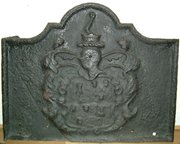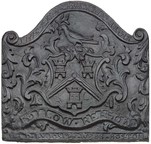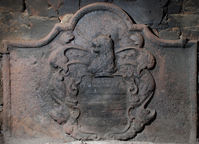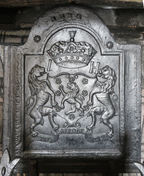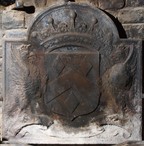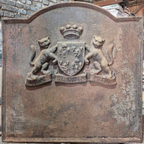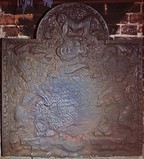-
932
Description: Carved wooden fireback pattern. Canted arched rectangular shape with cavetto-moulded astragal edging; coronet in arch; oval shield with a crowned lion lion rampant, supported two griffons reguardant, the whole within a cartouche, the bottom of which terminates in two swirls between which is a human mask.
Notes: Theodore Agrippa d'Aubigné
Arms: Theodore Agrippa d'Aubigné
- Decoration tags:
- rectangular with canted top corners and round arch (shape)
- astragal with cavetto (edging)
- whole carved pattern
- planklines
- armorial
Manufactured: in the early-17th century in France.
Current location: not known.
Citation: Carpentier, H., 1912, Plaques de Cheminées (Paris, published by the author).
- Attached to series:
- Patterns
- Personal armorial firebacks
-
16
Description: Arched rectangular shape cut away with symmetrical concave curves; ovolo moulding (top and sides); shield, helmet, crest and mantling of the family of Baker, of Mayfield, quartered with Farnden, of Sedlescombe: Quarterly, 1st and 4th, Argent, a tower between three keys erect sable (Baker); 2nd and 3rd, Purpure, a chevron vairy Or and gules, between three leopards’ faces Or (Farnden). Crest (Baker): on a tower sable an arm embowed in mail holding in the hand a flint-stone proper.
Notes: A carved armorial on a plain, edged base board; John Baker (1644-1723) married Ruth, daughter and co-heiress of Peter Farnden, in 1663; she died in 1691, thereafter the arms of Baker quartered those of Farnden; the arms of Farnden had been granted in 1634. The armorial design has been inadequately pressed into the sand bed.
Copies of this fireback are known.
Arms: Baker, of Mayfield, quartering Farnden, of Sedlescombe
- Decoration tags:
- rectangular with canted top corners and round arch (shape)
- ovolo (edging)
- carved pattern panels
- armorial
Manufactured: in the early- to mid-18th century possibly at Heathfield Furnace in the Weald area of England.
Current location: Battle Museum of Local History, Battle, East Sussex, England.
- Attached to series:
- Personal armorial firebacks
- Ironmasters armorial series
-
1058
Description: Rectangular; cavetto-moulded edging with an astragal inside; baroque-style shield of Montagu impaling Wriothesley.
Notes: Ralph Montagu (1638-1709), afterwards Earl of Montagu and later Duke, married Elizabeth Percy, née Wriothesley, daughter of the 4th Earl of Southampton, in 1673. She died in 1690; thus the fireback dates to between 1673 and 1690; Blazon: (Montagu) Argent, three lozenges conjoined in fess gules, a border sable; (Wriothesley) Azure, a cross or between four falcons close argent.
Arms: Montagu impaling Wriothesley
- Decoration tags:
- rectangular (shape)
- cavetto (edging)
- whole carved pattern
- heraldic
- armorial
Manufactured: in the late-17th century probably at Sowley Furnace, Beaulieu in England.
Current location: Palace House, Beaulieu, Hampshire, England.
- Attached to series:
- Personal armorial firebacks
- Wriothesley firebacks
-
1080
Description: Cast-iron fireback consisting of a panel with an arched top and scrolled ears. Decorated with reliefs, foliate borders at the sides, and in the centre with a coat of arms consisting of a shield, three castles separated by a chevron with an open compass, and with crest of a bird with a leafed branch in its beak, all elaborated with foliage. Motto along arched crest; motto in scroll below arms; maker’s name along bottom.
Notes: The arms are essentially those of the Premier Grand Lodge of England, granted in 1717, differenced by the motto; the Massachusetts Lodge was founded in 1733; the blazon is an adaptation of the arms of the Worshipful Company of Masons. Joseph Webb was a Boston ironmonger and chandler; his 1765 trade card was designed by fellow Freemason Paul Revere, who may also have cast the fireback.
Copies of this fireback are known.
Inscription: THE • FREE • MASONS • ARMS / FOLLOW • REASON / SOLD • BY • JOSEPH • WEBB • BOSTON
Arms: Massachusetts Grand Lodge of Freemasons
- Decoration tags:
- rectangular with round arch (shape)
- none (edging)
- whole carved pattern
- heraldic
- armorial
- text
Manufactured: in the mid- to late-18th century probably at North End Ironworks, Boston in the Massachusetts area of United States of America.
Current location: Museum of Fine Arts, Boston, Massachusetts, United States of America.
Museum number: 1982.618 (part of the Boston Museum of Fine Arts museum group)
- Attached to series:
- Personal armorial firebacks
-
850
Description: Canted rectangle; elaborate cavetto moulded edging (top and sides); strapwork shield with a demi-flower at each side, between initials (S only visible); arms quarterly of six, 1st Or two chevronels Gules, on a canton of the last a mullet of the first (Pope); 2nd Argent three bars Gules, on a canton ermine a bend of lozenges of the second (Walshe); 3rd Sable three laurel leaves in bend Or between two bendlets Argent (Waller); 4th Azure a chevron between three crosses Moline Argent (Lansdale); 5th Ermine on a bend Gules three lions’ heads erased Or (Weston); 6th Azure a lion rampant Or supporting a cross patée fitchée of the second (Pichingham).
Notes: The excrescence over the third quartering is the result of the iron being poured directly onto the mould. The second initial is known from another casting. The date above the shield has been inserted before casting and differs slightly from another example of the same back.
Copies of this fireback are known.
Inscription: 1625 / S [P]
Arms: Pope (Sackevile Pope (b. 1589) of Hendall, in Buxted, Sussex)
- Decoration tags:
- rectangular with canted top corners (shape)
- complex individual (edging)
- whole carved pattern
- date stamp
- armorial
- text
Manufactured: in 1625 in the Weald area of England.
Current location: not known.
- Attached to series:
- Personal armorial firebacks
- Low relief armorial series
-
913
Description: Rectangular with an arched rectangular style arch linked by symmetrical concave curves; ovolo moulding (top and sides); shield, helm, crest and mantling of the Fuller family. A number 7, the only visible part of the date seen on other castings is in the top right corner of the shield.
Notes: A carved armorial on a plain, edged base board; the arms of the Fullers of Brightling Park, Sussex: Argent, three bars and a canton gules; the crest; Out of a ducal coronet Or, a lion’s head argent; the Fullers were iron masters and gun founders in the first half of the 18th century, operating Heathfield furnace, where it is likely that this fireback was cast.
Inscription: [1] 7 / [4] [7]
Arms: Fuller, of Brightling, Sussex
- Decoration tags:
- rectangular with round arch (shape)
- ovolo (edging)
- carved pattern panels
- armorial
Manufactured: in 1747 probably at Heathfield Furnace in the Weald area of England.
Current location: in private hands, Brightling, East Sussex, England.
- Attached to series:
- Ironmasters armorial series
- Personal armorial firebacks
-
972
Description: Arched rectangular shape with ovolo-moulded edging and extensions to sides and top; central shield bearing arms with lion rampant supporters and motto scroll beneath; above, a marquesal coronet; date (over-pressed) in extension above main panel; inserted initials (slightly over-pressed) on either side of coronet.
Notes: The arms are of Henry Pierrepont, marquess of Dorchester and earl of Kingston-upon-Hull, of Thoresby Hall, Nottinghamshire (blazon: argent semi of cinquefoils gules, a lion rampant sable), with the motto: Pie Repone Te (Place yourself piously), a pun on the name, Pierrepont. Confusingly, the marquisate of Dorchester was created twice for members of the same family. In 1645 it was created for Henry Pierrepont, 2nd earl of Kingston-upon-Hull, becoming extinct on his death without surviving male issue in 1680. It was created again for Evelyn Pierrepont, the 5th earl of Kingston in 1706 who was subsequently elevated to the dukedom of Kingston in 1715. The original casting may therefore have dated to between 1645 and 1680 or between 1706 and 1715. The initials may be related to the Halls, the 2nd Duke of Kingston's mother's family, and were added to a subsequent casting which, in turn, could have pre-dated the addition of the dated extensions which have obliterated 'Dutch'-style dolphins known to have surmounted the original.
Inscription: 1722 / I H / PIE REPONE TE
Arms: Pierrepont, Marquess of Dorchester
- Decoration tags:
- rectangular with round arch (shape)
- ovolo (edging)
- whole carved pattern
- extension panels
- armorial
- text
Manufactured: in 1722 in England.
Current location: Red Lodge, Park Row, Bristol, England.
Museum number: NX420 (part of the Bristol Museums, Galleries and Archives museum group)
- Attached to series:
- Personal armorial firebacks
- Pierrepont series
-
1029
Description: Arched rectangular shape; cavetto-moulded edging; shield, supporters, earl's coronet and motto scroll.
Notes: The arms are of the Hyde family: azure, a chevron between three lozenges or; the supporters: two eagles, wings endorsed sable, ducally crowned and charged on the breast with a cross or; Edward Hyde (1609-74) was created earl of Clarendon in 1661. An excrescence over the sinister supporter indicates where the iron was poured clumsily into the open sand mould.
Arms: Hyde, earls of Clarendon
- Decoration tags:
- rectangular with round arch (shape)
- cavetto (edging)
- whole carved pattern
- heraldic
- armorial
Manufactured: in the mid- to late-17th century in England.
Current location: The Lygon Arms, High Street, Broadway, Worcestershire, England.
- Attached to series:
- Personal armorial firebacks
-
1324
Description: Arched rectangular shape; cavetto-moulded edging; shield with two cat supporters; above, a baron's coronet; below, a scroll bearing the motto 'Felis Demulcta Mitis'.
Notes: The Brocket barony was created in 1933. The blazon: Quarterly 1st & 4th Argent three salmon haurient Gules in chief an oak tree eradicated Proper (Cain); 2nd & 3rd Per chevron barry of six Gules and Or and of the first in chief two Stags' Heads caboshed proper and in base a Lion rampant guardant of the second (Nall); supporters, two cats guardant erminois. The text of the motto is intaglio.
Inscription: FELIS DEMULCTA MITIS - A stroked cat is gentle
Arms: Nall-Cain, Baron Brocket
- Decoration tags:
- rectangular with round arch (shape)
- cavetto (edging)
- whole carved pattern
- heraldic
- armorial
- text
- animals
- objects
Manufactured: in the 20th century in England.
Current location: not known.
- Attached to series:
- Personal armorial firebacks
-
1262
Description: Arched rectangular shape; ‘egg and dart’ ovolo moulding visible on top and sides; shield, helmet, crest, mantling and supporters of the Mohun family; above the crest, the initials 'EM'; date separated by the crest.
Notes: Cast from a finely carved pattern, the supporters denote these are the arms of a peer. The crest is: Gules, a maunch ermine, with a hand proper holding a fleur de lys or. An incomplete casting (without the initials or date) from Sidney Farm, Alfold, Surrey, is in Guildford Museum. Reginald Mohun (pron. Moon) of Dedisham, Slinfold, Sussex, married Elizabeth Blounte of Dedisham at Slinfold 21 Dec 1618. The Mohun barony of Okehampton, Devon was created in 1628. The fireback design probably dates from after that, the initials and date being added when this copy was cast in 1676. Bellmans auction, Wisborough Green, 1 Oct 2020 lot 3084 (£45).
Copies of this fireback are known.
Inscription: EM / 16 76 / [indecipherable motto]
Arms: Mohun family, barons of Okehampton
- Decoration tags:
- rectangular with round arch (shape)
- ovolo, egg and dart (edging)
- carved stamps
- whole carved pattern
- heraldic
- armorial
- text
Manufactured: in 1676 in England.
Current location: in private hands, Bromyard, Herefordshire, England.
- Attached to series:
- Personal armorial firebacks
- Mohun series
 carpentier p229 690x870.png)
